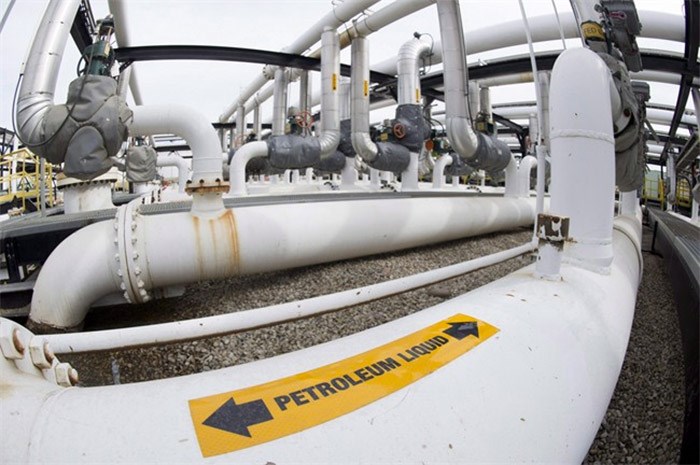 Pipes are seen at the Kinder Morgan Trans Mountain facility in Edmonton, Alta., Thursday, April 6, 2017. The Saskatchewan government has introduced legislation that would allow the province to control its oil and gas exports, similar to a bill recently tabled in Alberta. THE CANADIAN PRESS/Jonathan Hayward
Pipes are seen at the Kinder Morgan Trans Mountain facility in Edmonton, Alta., Thursday, April 6, 2017. The Saskatchewan government has introduced legislation that would allow the province to control its oil and gas exports, similar to a bill recently tabled in Alberta. THE CANADIAN PRESS/Jonathan Hayward
The Saskatchewan government has introduced legislation that would allow the province to control its oil and gas exports, similar to a bill recently tabled in Alberta.
Once passed, the law would establish a permitting process for people or corporations looking to export energy products outside the province.
Energy Minister Bronwyn Eyre said the lone difference is that Saskatchewan has a sunset clause in place until Jan. 31, 2019.
"There is a penalty system in place and again, it's identical to the Alberta legislation," Eyre said.
"This is really about export permits for truck and for track, anything that would in our case, Saskatchewan's case, be transporting natural gas, oil, refined products, would be subject to the export permits legislation."
The proposal does not mention British Columbia specifically, but Saskatchewan has said it is supporting Alberta in a dispute with B.C. over the Trans Mountain pipeline.
The expansion of the pipeline to the West Coast has been approved by the federal government, but B.C. is fighting it in the courts.
Eyre said that $2.6 billion has been lost from the sector in the province along with $200 million in royalties.
She acknowledged that there are issues with the bill and current trade agreements, but that Saskatchewan needs to defend its rights.
"There are issues with the constitution in terms of who will step up here to protect the resource sector and constitutionally speaking, again, we trump that because we have that responsibility over our energy sector," Eyre said.
"That's the law and that's in the constitution."
B.C. Attorney General David Eby said Monday that the government will review the Saskatchewan law to determine if it discriminates against his province.
"We've reviewed the Alberta legislation and if it's based on that legislation it's as unconstitutional in Saskatchewan as it is in Alberta," he said.
"The nature of the Canadian constitution is it applies across Canada. We'll have a look at that legislation and we'll make that determination about how to protect British Columbians from unconstitutional legislation that targets British Columbians."
Saskatchewan Opposition NDP Leader Ryan Meili said that his party is still looking over the bill and seeking out opinions regarding the legality of the measure.
"We heard some actors like the Canadian Fuels Association posing that this could potentially cause problems for workers in different areas of the economy," Meili said.
"I think any time you're starting to introduce trade barriers between provinces — however that is done — there's potential serious consequences and those need to be explored and understood."
Eyre said the bill is a last resort and will only be used if the pipeline continues to be stalled.
"This is not something that we want to do, we don't want to find ourselves in this position," she said.
— With files from Dirk Meissner in Victoria. Follow @RyanBMcKenna on Twitter.
![]()


